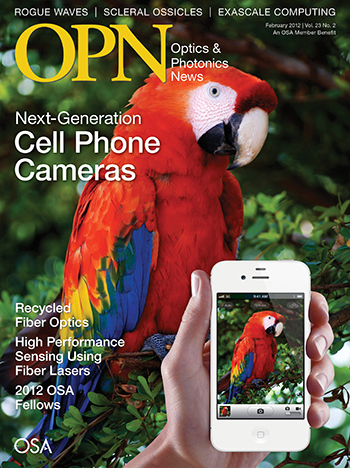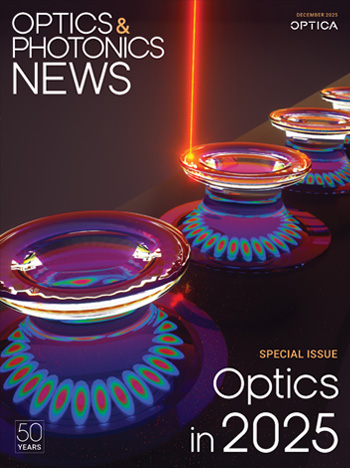
February 2012 Issue
Feature Articles
Next-Generation Cell Phone Cameras
The mobile camera market is being driven by consumers’ desire for big imaging capability in smaller and smaller packages. Despite the limitations imposed by these competing demands—or perhaps because of them—many companies are unleashing creative solutions that incorporate wafer-level optics, liquid lenses and LED flashes.
by Tim HayesRecycled Fiber Optics: How Old Ideas Drove New Technology
When it comes to fiber optics, everything old is new again. Crucial building blocks of modern technology were once written off as impractical, including single-mode fiber and wavelength-division multiplexing. Now coherent communication systems, abandoned in the 1980s, have become cutting-edge high-performance systems.
by Jeff HechtHigh-Performance Sensing Using Fiber Lasers
Fiber laser sensors are capable of achieving fundamentally limited strain resolution. Their high sensitivity per unit length enables new sensing possibilities, miniaturization of existing sensors and simplification of sensing mechanisms.
by Gary A. Miller, Geoffrey A. Cranch and Clay K. KirkendallDepartments and Columns
OPN Talks with Greg Papadopoulos
Our conversation with Greg Papadopoulos, venture capitalist and OFC/NFOEC plenary speaker.
A Modest Proposal on the Evolution of the Eye
Is there an evolutionary link between the bony plates that surrounded the eyes of some prehistoric creatures and the iris as we know it today?
A team of researchers from Spain, France and Brazil found a way to generate rogue waves and developed a model for understanding them as a result of a deterministic nonlinear process.
Presidential profile: Karl Gunther Kessler and Walter Lewis Hyde.
Microring Resonator Comb Shapes Ultrashort Pulses
A team based at Purdue University has crafted a tiny, chip-sized ring resonator comb that generates shaped pulses.
Researchers at the Technical University of Munich (Germany) used single-molecule force spectroscopy with ultrastable optical tweezers to measure the length of a single protein and the force required to cause a change in the folding state.
Suppressing Spontaneous Emission Inside a Photonic Crystal
Scientists at the University of Twente (Netherlands) have demonstrated a prediction made nearly a quarter-century ago: that spontaneous emission of light can be inhibited within a 3-D photonic bandgap.
Also in this Issue
Sixty-six OSA members were recently elevated to the rank of Fellow.


![Manual probe system with needles for test of semiconductor on silicon wafer. [A. Morozov / Getty]](https://opnmedia.blob.core.windows.net/$web/opn/media/images/articles/2025/1125/departments/202511-cover-web.jpg?ext=.jpg)
![Researcher Clara Saraceno in the lab. [Image by Carsten Behler Photography]](https://opnmedia.blob.core.windows.net/$web/opn/media/images/articles/2025/1025/departments/202510-cover-web.jpg?ext=.jpg)
